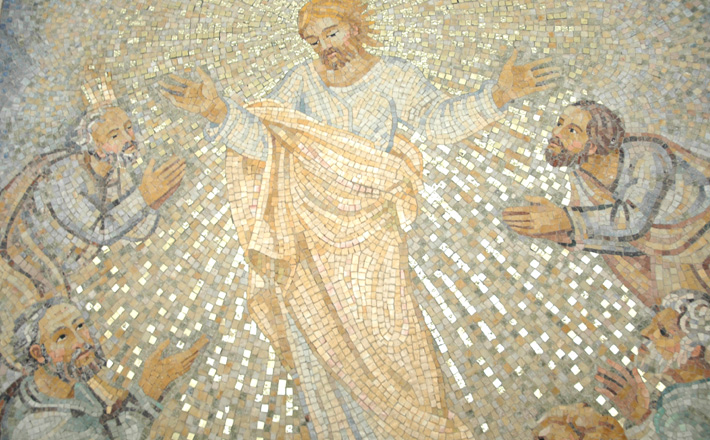Commentary on Psalm 2
Transfiguration is a Sunday that suffers considerable theological confusion.
It’s the same confusion we suffer every Sunday, but the story of Jesus’ shining (joined by Moses and Elijah) trains the brilliant light of God on the mix-up like the sun through a magnifying glass, and our preaching and worship assumptions go up in flames. We think the Bible is about us, and to the listener, a good sermon is about me, my faith, my serving, my doubts, my hope.
But the Bible is primarily about God, and sermons should primarily be about God. Psalm 2 isn’t about us at all. Superficially Psalm 2 is a “royal Psalm,” extolling the grandeur of Israel’s sitting king. But that king is only a surrogate for the true king, Yahweh. Before this Divine Monarch, just as before the transfigured Christ, our response is “fear and trembling,” and perhaps “kissing his feet” (Psalm 2:11). The sermon’s takeaway is a long, breathless sigh, and we stammer trying to make sense of how great God really is.
Mind you, if we “get” the greatness of this God, there is a benefit for us. Psalm 2 ends with the very word that begins Psalm 1: ashre, “blessed.” This dual opening to the Psalter suggests that when we praise Yahweh, we are blessed. The blessing, in fact, is the being lost in wonder, love and praise — or as Psalm 73:28 puts it, “For me it is good to be near God.” Praise isn’t productive or useful. We waste time, awed by God.
There is joy in this being awed. Psalm 2:4 envisions God looking down on the plotting, machinations, strategies and pomp of even the world’s most fabulous rulers, maybe Rameses or Hammurabi or Tiglath-Pileser or Nebuchadnezzar — and while everyone on earth shivers in terror, God laughs. God’s laugh has a hint of mocking, but it’s more delight, the calm giggle that is unfazed, non-anxious, sure of victory. And so we have good cause to be calm, non-anxious, and even joyful in the teeth of danger.
Of course, there’s some wry, quixotic humor in this kind of assertion. Robert Alter says that Psalm 2’s cocky talk about God’s overwhelming might, and how his surrogate king will smash the other potentates, is a “geo-theological paradox.” Jerusalem was a modest town on a more modest hill, the fledgling capital of an even more modest nation, just barely noteworthy in the annals of history — at least those penned by the big guys. The titanic victories sung about in the Psalm never happened, at least not on the stage of history. Yahweh rules?
Of course, we can view Psalm 2 from the wide-lens perspective of the entire canon, and understand that Jesus was the victim of the powers “taking counsel together against the Lord and his anointed,” and that it was the mocked and crucified Jesus who “burst the bonds asunder,” the shackles of the grave itself. But even if we say Jesus is the king who reigns, we still have to admit that all the victorious crushing of foes has never happened. To this day, evil roams unchecked, God is mocked all day, every day, and the Church increasingly is a joke on planet earth.
So how do those who praise make sense of the Psalm, and every claim of the Bible? We can parse it eschatologically: things are bad now, but in the end God will right all wrongs and restore God’s kingdom. Clint McCann, in his excellent Psalms commentary in the New Interpreter’s Bible, points to Flannery O’Connor’s “Why Do the Heathen Rage?” — in which a mother laments that her son won’t take over the family farm after her husband’s stroke. Instead he reads “irrelevant books.” One day she picked one up — and it fell open to a letter from St. Jerome to Heliodorus, something about battle trumpets, a great General marching to conquer the world. Her son, instead of taking on the farm, was reading about King Jesus coming to conquer the world.
Or we can detect a hidden, subterranean plot unfolding even now — perhaps like Augustine’s dual, dueling cities, the apparent march of history rumbling along, but then God’s mysterious but certain work unfolding just as surely, even if not right out in the open. Or we can more simply but frustratingly say that God just has a different way of ruling. Jesus ruled the nations when he washed feet, when he touched lepers, when he went off to a lonely place to pray, when he stood silent before Pilate.
We cannot be sure how to read the Psalm, and that is perhaps as God would have it. We simply read. We ponder. We are amazed. We wonder. Much like that day of the Transfiguration. There were no tasks, no to-do-lists, no goals, strategies and metrics, no doing right or wrong, no being right or wrong. Jesus was glowing. The temple, where Psalm 2 was recited, sung, trumpeted, shouted perhaps, was like some kind of chamber with atomic rays (as Amos Wilder once put it). Ours is to read, listen, tremble, hope, wait, forgetting to check what time it is, or even that there’s a smart phone in my pocket. We listen for the laugh from God’s throne. Then all we can do is shake our heads, and smile.


February 26, 2017